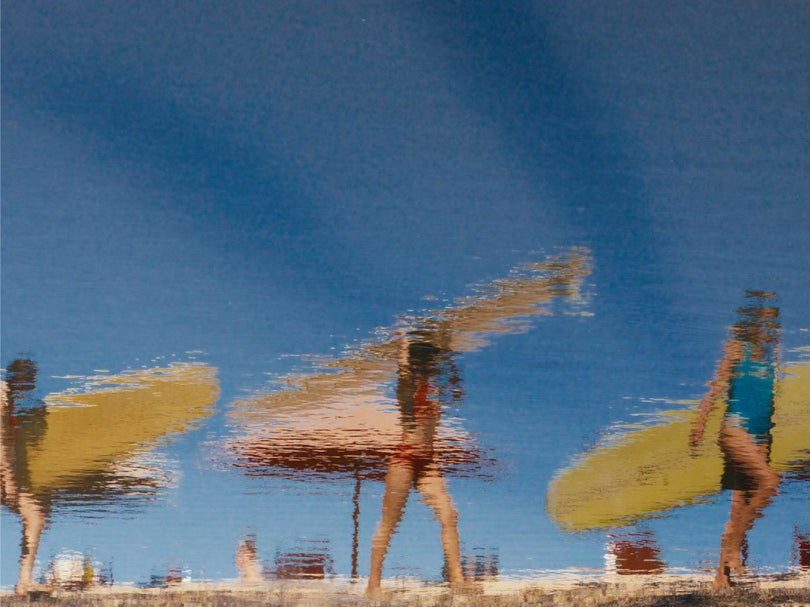The ocean is a remarkable ecosystem that supports and influences all life on our planet! It is home to the majority of Earth's biodiversity and produces about 50% of our oxygen. We depend on the ocean for recreation and sustenance, so it's essential to care for its vitality and ensure a sustainable future. This can be achieved through small daily actions, which can lead to a larger positive impact!
Every year, we celebrate World Ocean Day to encourage conscious living in support of a sustainable future for our oceans.
World Ocean Day 2025 marks the second year of a multi-year action theme: Catalyzing Action for Our Ocean and Climate. During June and throughout the rest of the year, World Ocean Day aims to promote a healthy blue planet and foster a more just, equitable, and sustainable society. Through collective effort, we can create a brighter future for our ocean and Earth.
This year, we reached out to our Seea community to learn how they are minimizing their impact on the oceans. At Seea, we believe that small daily habits can lead to significant global changes. We can all choose to live more consciously. Discover what our Seea community is doing to make a difference!

"Use non-toxic shampoo and conditioner. These products can leach into the ocean off our bodies and can be detrimental to the reefs and ecosystems. Not only are they dangerous for the oceans, they are dangerous for us too." -Leah Dawson, Seea team rider
Toxic shampoos and conditioners can leach from our showers and into the ocean impacting marine life and water quality. Chemicals like sulfates, parabens, and phthalates can disrupt marine organisms' reproductive systems, cause algal blooms, and lead to the accumulation of toxins in the food chain. Micro plastics from plastic shampoo bottles can also make their way into the oceans harming sea life.
Using non-toxic shampoos, conditioners, and soap reduces your direct impact on the ocean. Look for products that are free of harmful ingredients like sulfates, parabens, and triclosan, as well as those that are made with plant-based ingredients and packaged in sustainable, reusable, or recyclable containers. We love our friends over at DIP, but there are tons of great options out there!

"Wear natural sunscreens and avoid spray sunscreens. I don’t wear spray sunscreen because a lot of it ends up in the air or on the sand instead of my skin, which means more harmful chemicals can make their way into the ocean." -Mele Saili, Seea team rider
Similar to toxic hair products, non-reef safe sunscreens have harmful impacts on the oceans and coral reefs. Non-natural and non-reef safe sunscreens contain chemicals like oxybenzone, octinoxate, and avobenzone that can cause coral bleaching, DNA damage, and other negative effects on marine life.
Reef-safe sunscreens, which are formulated with mineral-based UV filters like zinc oxide and titanium dioxide, are a better option for protecting marine ecosystems. They are also better for your skin! We love AVASOL because it is mineral-based, reef-safe, and you can build it up for more sun protection!

"Don't wash polyester clothing in the washing machine. We should be conscious of and protect our watershed. I try to buy as little new polyester as possible." -Madison Isbell, Seea Brand Manager
Washing polyester clothing in a washing machine releases microfibers and microplastics into the water. These microfibers can enter rivers, lakes, and oceans and be ingested by marine life, and then enter the human food chain.
To avoid releasing microplastics into the ocean through machine washing, gently wash polyester clothing by hand in cold water with natural detergents. If you do need to wash your polyester clothing in the machine, use a Guppyfriend Washing Bag (this collects the microplastic), wash the clothing on a low, cold cycle, and use natural detergents.
"Wearing a rashguard and leggings instead of using sunscreen on your body avoids toxic run off into the ocean." -Rosie Jaffurs, Seea team rider
Instead of lathering yourself in sunscreen, use sun protective, long layers like rashguards and bodysuits. This is a double-whammy; you are protected from harsh UV for your entire session, and you avoid leaching harsh chemicals into the water by wearing sunscreen.
We recommend using rashguards like our Doheny Rashguard or The Dory. Protecting your legs is also important! We have great bodysuit options like The Kat bodysuit and The Nazare that can be layered with rashguards for full protection.

"Practice sustainable fishing practices, don't catch more than you can eat, and never leave your lines." -Rhea Abrams, Seea textile developer
When fishing, find ways to minimize your impact on the fragile ecosystem while still enjoying the practice. Never catch more than you can eat. Do not let fish go to waste, be conscious of how much you will consume, and don't get greedy! Avoid catching juvenile and endangered species and try to minimize bycatch. Always maintain a good distance from breeding grounds and sensitive habitats. Also, never use lead tackle, use as many parts of the fish as possible, and pack everything you brought in out!
"Use reusable coffee cups, water bottles, and food containers at work, school, and at the beach!"-Eva Levy, marketing
This one is so simple, but creates strong habits! If we all band together to reduce our consumption and plastic use, we can change the culture. Avoid using plastic containers when getting takeout, bring your favorite reusable water bottle to the beach, and make coffee at home to minimize your use of to-go cups!
These are all simple changes, but we hope they inspire you to start conversations, create new habits, and live more consciously! Happy World Oceans Day!

Check out other Blogs:
Five Ways to Tackle the Plastic Problem
Conscious & Sustainable Lifestyle Ideas Submitted By Our Customers








